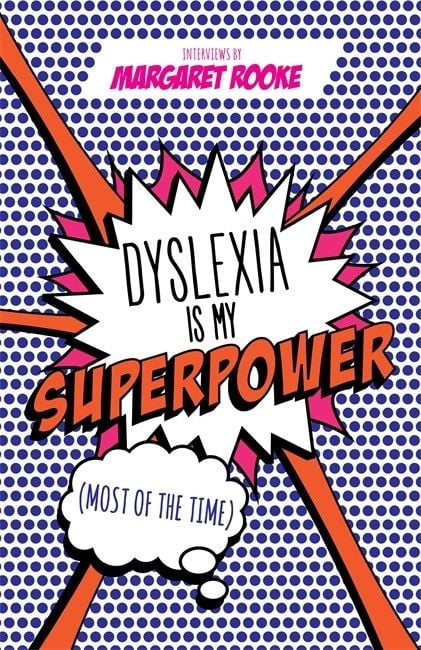
Margaret Rooke has a new book that interviews over 100 young people 8-18 years old about their dyslexia. Not only is the book filled with many messages from the heart, it also shares practical tips that will help many feel like they’re not alone. You may recognize Margaret from her other book, Creative Successful Dyslexic. In that book, Margaret interviewed 14 prominent adults about their dyslexia journey.
 From Dyslexia is My Superpower:
From Dyslexia is My Superpower:
“I feel like my brain is creatd in the way no one else’s is. I think of a brain being shot by a lightning bolt of smartness.”
“It’s good for my imagination. If I have to write a story I am good at thinking up the details. It may be hard for me to write, but I can picture it in my head. I can see it and smell it.”
“To me, dyslexia is just the extra creativity. That’s the main focus. I like to draw. I like to create things. I do a lot of drawing and a lot of craft projects in whatever space I can find.”
“One of my superpowers is that I am good at knowing how people feel. Everyone always says that I am very friendly and kind and good at aring for people. That might be something I have learned from having to think differently because of my dyslexia.”
“When it all gets too much, my strategy is to have a what I call a ‘power cry’. I cry for ten minutes and then I carry on working….You can’t beat a good cry…we found out when I was a bit older that I was good vocally and good at drama. I’m already working as an actor…I’m in my final year of high school now and studying Drama, English, Music, Media Studies , and Religious Education. I’m pretty excited about leaving, but I’m also loving the classes I’m taking.”
Margaret’s book also has tips that young people wanted to share with others. There’s nothing like advice coming from someone who has gone through what you have. The following are just examples, but there are many other great pearls of advice from these inspiring young people.
“You have to work hard at things like punctuation and spelling, but it’s so important to concentrate on your strengths. Focusing only on your negatives just won’t help you.”
“Don’t put us in a group with other people with learning difficulties when we shouldn’t be in that group. I was confident in the main class. Now I’m not confident.”
“Let us fiddle with stuff when we do our work. I like a piece of Blu-Tack. It gets your mind on track.”
“If I read a book and don’t understand a word on the page. I write a sticky note and put it underneath the word so I can check it later.
Congrats Margaret on your new book and thanks to all the generous young people who shared their stories!















I can’t wait to read the book!!!